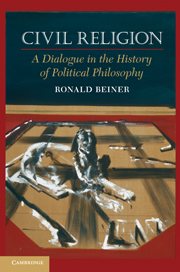Book contents
- Frontmatter
- Contents
- Preface and Acknowledgments
- Introduction
- Part I Machiavelli, Hobbes, Rousseau
- Part II Responses to (and Partial Incorporations of) Civil Religion within the Liberal Tradition
- 9 Baruch Spinoza
- 10 Philosophy and Piety
- 11 Spinoza's Interpretation of the Commonwealth of the Hebrews, and Why Civil Religion Is a Continuing Presence in His Version of Liberalism
- 12 John Locke
- 13 “The Gods of the Philosophers” I
- 14 Bayle's Republic of Atheists
- 15 Montesquieu's Pluralized Civil Religion
- 16 The Straussian Rejection of the Enlightenment as Applied to Bayle and Montesquieu
- 17 “The Gods of the Philosophers” II
- 18 Hume as a Successor to Bayle
- 19 Adam Smith's Sequel to Hume (and Hobbes)
- 20 Christianity as a Civil Religion
- 21 John Stuart Mill's Project to Turn Atheism into a Religion
- 22 Mill's Critics
- 23 John Rawls's Genealogy of Liberalism
- 24 Prosaic Liberalism
- Part III Theocratic Responses to Liberalism
- Part IV Postmodern “Theism”
- Conclusion
- Index
- References
10 - Philosophy and Piety
Problems in Spinoza's Case for Liberalism (Owing to a Partial Reversion to Civil Religion)
Published online by Cambridge University Press: 05 June 2012
- Frontmatter
- Contents
- Preface and Acknowledgments
- Introduction
- Part I Machiavelli, Hobbes, Rousseau
- Part II Responses to (and Partial Incorporations of) Civil Religion within the Liberal Tradition
- 9 Baruch Spinoza
- 10 Philosophy and Piety
- 11 Spinoza's Interpretation of the Commonwealth of the Hebrews, and Why Civil Religion Is a Continuing Presence in His Version of Liberalism
- 12 John Locke
- 13 “The Gods of the Philosophers” I
- 14 Bayle's Republic of Atheists
- 15 Montesquieu's Pluralized Civil Religion
- 16 The Straussian Rejection of the Enlightenment as Applied to Bayle and Montesquieu
- 17 “The Gods of the Philosophers” II
- 18 Hume as a Successor to Bayle
- 19 Adam Smith's Sequel to Hume (and Hobbes)
- 20 Christianity as a Civil Religion
- 21 John Stuart Mill's Project to Turn Atheism into a Religion
- 22 Mill's Critics
- 23 John Rawls's Genealogy of Liberalism
- 24 Prosaic Liberalism
- Part III Theocratic Responses to Liberalism
- Part IV Postmodern “Theism”
- Conclusion
- Index
- References
Summary
[I]t is only in concession to the understanding of the multitude and the defectiveness of their thought that God is described as a lawgiver or ruler, and is called just, merciful, and so on.
– Spinoza[A]s to the question of what God…really is,…this is irrelevant to faith.
– Spinoza[T]he truth of a philosophy exists in its effects.…[I]f you would understand Spinoza, look to his critics. Of what did they accuse him? What in his philosophy did they find most objectionable? How strong was their reaction? What legal and coercive measures did his work provoke?
– Warren MontagGradually the ordinary people are enlightened.
– Thomas HobbesAs Spinoza states very clearly in the subtitle of the Theological–Political Treatise, the central purpose of the book is to demonstrate the unqualified compatibility between piety and “freedom of philosophizing.” A liberal society requires a protected space for intellectual freedom. The foundations of this project are laid at the end of chapter 13 with the argument that “the intellectual knowledge of God which contemplates his nature as it really is in itself…has no bearing on the practice of a true way of life, on faith, and on revealed religion.” What defines religion rightly conceived is the practical obligation to practice justice and charity on the assumption that one is thereby imitating God's justice and charity. Philosophers can think what they please because religion is not a matter of having an intellectual grasp of propositions about the nature of God. Investigations in the realm of metaphysical truth (including metaphysical inquiry into the nature of God) can be safely left in the hands of scientists and philosophers without any cause for worry that these investigations will impinge upon the authority of religion: Understanding that religion is a matter of practice, not theory, makes clear that the full intellectual freedom exercised by philosophers like Spinoza in a liberal society can do no harm to (again, “has no bearing on”) the practice of religious faith and piety. Moral practice, and that alone, is the test of piety or impiety, which means that there can be no impiety in philosophical inquiry per se, however much it pushes the boundaries of intellectual freedom. There is no moral obligation to hold correct beliefs (and given “the limited intelligence of the common people,” this would in any case be a moral obligation that it would be impossible to make good on); conversely, the philosophizing of philosophers is a completely independent enterprise, so that, once again, what results intellectually from philosophers philosophizing is of no relevance to the demands of piety. Hence, in the words of Letter 30, liberalism is “vindicated.” (That is, the intellectual freedom that is at the core of a liberal society receives moral certification not for the positive reason that it advances moral and religious welfare – though Spinoza is clearly committed to that view as well – but primarily for the negative reason that it leaves piety untouched.)
- Type
- Chapter
- Information
- Civil ReligionA Dialogue in the History of Political Philosophy, pp. 113 - 120Publisher: Cambridge University PressPrint publication year: 2010



